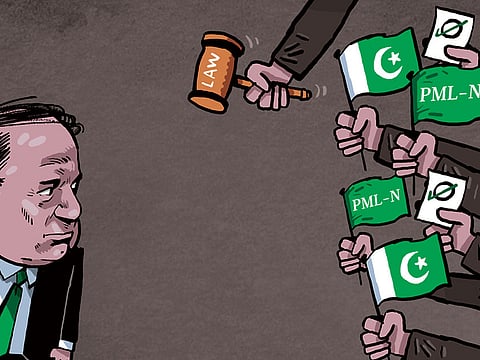Nawaz Sharif to get sympathy votes because of court verdict
Public sentiment will catapult PML-N to victory, if their leader returns to Pakistan to revive the election campaign

The political dynamics in Pakistan are changing faster than expected in the lead-up to the July 25 general elections.
One event that would have an impact on the elections is the conviction of Nawaz Sharif. The three-time prime minister has been sentenced to 10 years of rigorous imprisonment on charges of “corruption”. His daughter Maryam Nawaz, who has been pitched as his political heir and a potential prime minister, has also been sentenced to seven years for “abetment” after she was found to be “instrumental in concealing the properties of her father”. She has also been disqualified from contesting the elections.
The special National Accountability Court announced the verdict in absentia after a nine-month trial on the reference filed by Pakistan’s National Accountability Bureau (NAB). Sharif and his daughter are in London tending to Sharif’s ailing wife, Kulsoom Nawaz.
The case stemmed from the so-called Panama Papers leak that revealed undeclared luxury properties owned by the Sharif family in London since 1993. The four flats are in Avenfield House on London’s Park Lane. The Panama Papers leak in 2015 showed that Sharif’s children had links to offshore companies, which were allegedly used to channel funds and buy foreign assets.
Some analysts and political groups close to the establishment believe that “it is all over for Sharif”, but I believe that the Sharifs are very much in the game and would derive more strength from this court verdict. He would surely gain a “sympathy” vote and his party, the Pakistan Muslim League-Nawaz, will fare well in the elections.
This is not the first time that a dissenting politician has been sent to prison on corruption charges. But it is the first time that the onus of proof has been shifted to the accused instead of the prosecution. The court’s decision is based on the accused’s inability to prove his innocence rather than prosecution proving the defendant guilty. So it may be thrown out in the appeals court.
The verdict may have come as a blessing in disguise for the Sharifs. Though the situation presents a serious challenge to the PML-N and the establishment, Sharif is likely to have the last laugh. Pakistani voters are very emotional people, who believe that their leaders are being victimised by the establishment whenever they come under fire.
Some years ago, one of the most reviled politicians in the country Asif Zardari formed the government in Pakistan. He became the country’s president too, after his wife and Pakistan Peoples Party Chairperson Benazir Bhutto was assassinated just before the 2008 elections sheerly on the strength of a massive sympathy wave.
The timing of the verdict ahead of the election shows that some ‘unseen forces’, as Sharif claimed, are working against him to keep him and his family out of politics. The public deserves to ask the question what happened to the other more than 400 accused in the Panamagate scandal. Why didn’t the NAB bring charges against them? What about other politicians and bureaucrats who have properties, business and investment outside Pakistan?
Symbol of resistance
The verdict against Sharif has given a sudden boost to the PML-N’s lacklustre election campaign. His brother Shahbaz Sharif kickstarted the campaign, but PML-N supporters were waiting for Sharif to come from London to revive the campaign with his speeches. If the elections are impartial and transparent, it would be almost impossible to defeat PML-N in Punjab and the PPP in Sindh.
Now, the PML-N will become a symbol of resistance and its prospects will increase with Sharif’s return. PML-N supporters at the grassroots level are convinced that their leaders are being victimised through the NAB and courts. The party would definitely win the largest province — Punjab — with a clear majority, even if Sharif and his daughter stay behind bars.
The verdict against Sharif does not mean that Imran Khan or Bilawal Bhutto Zardari would make a clean sweep of the elections. It will not be an easy ride especially for Imran although he has given tickets to a number of known corrupt ‘electables’ who defected from other political groups in the hope of forming the next government.
However, if Sharif decides to stay back in London, his absence would certainly strengthen the anti-Sharif narrative, and that would swing the momentum in favour of Imran.
Sharif’s presence in Pakistan is critical to his party’s election fortunes, particularly since several senior PML-N leaders have been barred from the elections by courts. Many others have defected or simply quit under pressure.
Elections provide the best platform for people to elect their leader. For that, there should be a level playing field. Taking Sharif out of the equation doesn’t seem right.
Sharif’s best response would be to return to Pakistan and lead his party to victory. That would win him more popularity. People would believe him even more. So, the game is not over for the Sharifs yet.
Sign up for the Daily Briefing
Get the latest news and updates straight to your inbox



